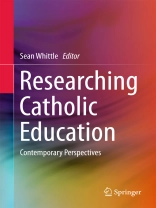This book presents a range of perspectives on the current state of Catholic education in the opening decades of the twenty-first century. All of the chapters have their origin in an International Conference on Catholic Education, held at Heythrop College (University of London) in September 2016. The book brings together many leading scholars to present a survey of the latest research on Catholic education in areas such as the aims of Catholic education, Catholic schools and Catholic identity, leadership issues in Catholic schools and fresh thinking about the place of Religious Education (RE) in Catholic Education.
This book demonstrates how the field of Catholic Education Studies has firmly come of age. Rather than being a subfield of educational or theological discourse, it is now an established field of research and study. As such, the book invites readers to engage with much of the new thinking on Catholic education that has grown rapidly in recent years. It offers a broadrange of contemporary perspectives on research in Catholic Education and rich insights into current thinking about Catholic Education.
Mục lục
Chapter 1 Introduction: Dr Sean Whittle.- Part One: The field of Catholic education Studies: Mapping out the terrain.- Chapter 2 New Thinking, New Scholarship and New Research in Catholic Education. Some perspectives on this field of study.- Chapter 3 Diversity and Differentiation in Catholic Education.- Chapter 4 Research and Educational Practice in Catholic Education Studies.- Chapter 5 Catholic identities in Catholic schools: Fragmentation and bricolage.- Part Two: New Thinking about the politics and philosophy of Catholic education.- Chapter 6 Faith Schools in a Secular Society: should they continue?.- Chapter 7 Catholic schools as an expression of political theology.- Chapter 8 The Preferential Option for the Poor and Catholic Schools.- Chapter 9 Catholic schools, Liberalism and Strategies for the Formation of Catholic Identity.- Chapter 10 The ambiguous embrace: The pros and cons of accepting government funding.- Chapter 11 The role of Governors in Catholic Education – a neglected constituency?.- Part Three: New thinking about Catholic school leadership.- Chapter 12 Educational Leadership in Catholic Schools: a practice based theology of vocation.- Chapter 13 Interpreting the Tradition.- Chapter 14 Leadership Among School Children in a Catholic School: A courageous dance of love.- Chapter 15 Getting Embedded Together: New Partnerships for 21st Century Catholic Education.- Part Four: New thinking about Religious Education in Catholic schools.- Chapter 16 Religious Education in Catholic Second-level Schools in Ireland: Drawing on Our Heritage, Living in the Present, Anticipating New Directions.- Chapter 17 RE and Catholic education: A Scottish Perspective.- Chapter 18 Testing Times for Religious Education in Catholic Schools in England and Wales.- Chapter 19 Science and Religion in Catholic education.
Giới thiệu về tác giả
Dr Sean Whittle is a Visiting Research Fellow at Heythrop College, University of London, and at St Mary’s University in Twickenham. He is also a Research Associate with the Centre for Research and Development in Catholic Education (CRDCE), with Professor Gerald Grace. Alongside these academic roles he works part-time as a secondary school RE teacher at Gumley House FCJ Catholic School in West London. He completed his doctoral studies at the Institute of Education—UCL, defending a thesis on the theory or philosophy of Catholic education. His book A Theory of Catholic Education (Bloomsbury 2014) presents a robust philosophy of Catholic education that draws heavily on insights from Karl Rahner. He controversially argues in support of a non-confessional theory of Catholic education. In December 2016 Routledge published Vatican II and New Thinking about Catholic Education, which is a collection of essays edited by Dr Whittle on the impact and legacy of Gravissimum Educationis. Inrecent years he has been collaborating with other academics working in the field of Catholic education in order to create the Network for Researchers in Catholic Education.











